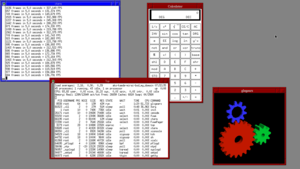 Free, Functional, and Secure | |
 | |
| Developer | Theo de Raadt et al. |
|---|---|
| Written in | C, assembly, Perl, Unix shell |
| OS family | Unix-like (BSD) |
| Working state | Current |
| Source model | Free software |
| Initial release | July 1996 |
| Latest release | 7.6 (8 October 2024) [±] |
| Repository | |
| Package manager | OpenBSD package tools[1] |
| Platforms | Alpha, x86-64, ARMv7, ARMv8 (64-bit), PA-RISC, IA-32, LANDISK, Loongson, Omron LUNA-88K, MIPS64, macppc, PowerPC, 64-bit RISC-V, SPARC64[2] |
| Kernel type | Monolithic |
| Userland | BSD |
| Default user interface | Modified pdksh, X11 (FVWM) |
| License | BSD, ISC, other permissive licenses[3] |
| Official website | www |
OpenBSD is a security-focused, free software, Unix-like operating system based on the Berkeley Software Distribution (BSD). Theo de Raadt created OpenBSD in 1995 by forking NetBSD 1.0.[4] The OpenBSD project emphasizes portability, standardization, correctness, proactive security, and integrated cryptography.[5]
The OpenBSD project maintains portable versions of many subsystems as packages for other operating systems. Because of the project's preferred BSD license, which allows binary redistributions without the source code, many components are reused in proprietary and corporate-sponsored software projects. The firewall code in Apple's macOS is based on OpenBSD's PF firewall code,[6] Android's Bionic C standard library is based on OpenBSD code,[7] LLVM uses OpenBSD's regular expression library,[8] and Windows 10 uses OpenSSH (OpenBSD Secure Shell) with LibreSSL.[9]
The word "open" in the name OpenBSD refers to the availability of the operating system source code on the Internet, although the word "open" in the name OpenSSH means "OpenBSD". It also refers to the wide range of hardware platforms the system supports.[10] OpenBSD supports a variety of system architectures including x86-64, IA-32, ARM, PowerPC, and 64-bit RISC-V.
- ^ Cite error: The named reference
faq15-pkgswas invoked but never defined (see the help page). - ^ Cite error: The named reference
platwas invoked but never defined (see the help page). - ^ Cite error: The named reference
policywas invoked but never defined (see the help page). - ^ Cite error: The named reference
coremailwas invoked but never defined (see the help page). - ^ OpenBSD Project (19 May 2020). "OpenBSD". OpenBSD.org. Retrieved 12 October 2020.
- ^ "Murus App, Apple PF for macOS from OpenBSD".
- ^ "Android's C Library Has 173 Files of Unchanged OpenBSD Code". Retrieved 8 October 2018.
- ^ "LLVM Release License". Retrieved 8 October 2018.
- ^ "OpenSSH for Windows". Retrieved 8 October 2018.
- ^ Cite error: The named reference
infoworld_new_years_resolutionwas invoked but never defined (see the help page).